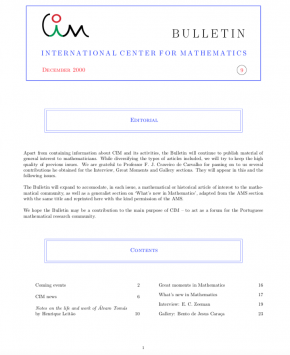Apart from containing information about CIM and its activities, the Bulletin will continue to publish material of general interest to mathematicians. While diversifying the types of articles included, we will try to keep the high quality of previous issues. We are grateful to Professor F. J. Craveiro de Carvalho for passing on to us several contributions he obtained for the Interview, Great Moments and Gallery sections. They will appear in this and the following issues.
The Bulletin will expand to accomodate, in each issue, a mathematical or historical article of interest to the mathematical community, as well as a generalist section on ‘What’s new in Mathematics’, adapted from the AMS section with the same title and reprinted here with the kind permission of the AMS.
We hope the Bulletin may be a contribution to the main purpose of CIM – to act as a forum for the Portuguese mathematical research community.
Coming Events
2-6
2-11 May: School on Algorithmic Aspects of the Theory of Semigroups and its Applications
invited lecturers: J. Almeida (Porto), C. Choffrut (Paris VII), J. Fountain (York), S. Margolis (Bar-Ilan), L. Ribes (Carleton), M. Sapir (Vanderbilt), M. Volkov (Ekaterinburg), T. Wilke (Kiel).
4-8 June: School on Automata and Languages
invited lecturers: M. Branco (Lisbon), V. Bruyère (Mons), O. Carton (Marne-la-Vall ́ee), A. Restivo (Palermo).
11-13 June: Workshop on Model Theory, Profinite Topology and Semigroups
invited lecturers: J. Almeida (Porto), T. Coulbois (Paris VII), H. Straubing (Boston College), P. Trotter (Tasmania), P. Weil (Bordeaux).
2-6 July: School on Semigroups and Applications
invited lecturers: K. Auinger (Vienna), M. Lawson (Bangor), W. D. Munn (Glasgow), A. Pereira do Lago (São Paulo).
9-11 July: Workshop on Presentations and Geometry
invited lecturers: R. Gilman (Stevens Inst. of Tech.), D. McAlister (DeKalb), J. Meakin (Lincoln), S. Pride (Glasgow), N. Ruskuc (St. Andrews), B. Steinberg (Porto).
CIM News
6-9
Professor José Sousa Pinto, Secretary of the CIM Gen- eral Assembly since 1996, died in August 2000 after a long illness. He was a Professor at Aveiro University, and his main research interest was nonstandard analysis and generalized functions. A book by Prof. Sousa Pinto, Métodos Infinitesimais de An ́alise Matem ́atica, was published by the Gulbenkian Foundation in 2000.
Notes on the life and work of Álvaro Tomás
Henrique Leitão
10-15
Alvarus Thomas (fl. 1509), a Portuguese master at the University of Paris at the beginning of the sixteenth century, is still a poorly known historical figure. In his Liber de triplici motu he presented a comprehensive and sophisticated analysis of the theory of proportions and of the science of motion of his time, in the characteristic form of the Calculatory tradition. Besides some interesting criticism of contemporary physical theories, this work is also relevant from the point of view of mathematics since Thomas achieves some surprising results in the study of infinite series.
In this paper I summarize the present knowledge on Alvarus Thomas. I collect all biograph- ical information currently available and present very briefly the contents of the Liber de triplici motu adding some observations on its historical context and influence.
In this issue we present the answers of two researchers, Gudlaugur Thorbergsson and Mark Pollicott, to the question “If you had to mention one or two great moments in XXth century mathematics which one(s) would you pick?”.
Race to settle Catalan conjecture: it’s people vs. computers
Ivars Peterson reports in the December 2, 2000 Science on recent progress towards the resolution of this 150- year-old conjecture.
E. C. Zeeman
F. J. Craveiro de Carvalho
19-22
As part of my homework for this interview I read a por- tuguese translation of the interview you gave to Lewis Wolpert for BBC, Radio 331 Some of the questions I am going to formulate are based on that interview and I want to express my debt to him.
Bento de Jesus Caraça – The Man and his Time
Ulpiano Nascimento
23-24
We will not be talking about Bento de Jesus Cara ̧ca the mathematician, who is sufficiently well-known.
We will be talking about Professor Bento Cara ̧ca the man, who, from his birth in 1901, fought for survival and was only saved by a miracle. A life which only lasted 47 years, but which was enough to enrich his era and to bequeath to us a cultural and ethical legacy of the highest and incomparable value.
